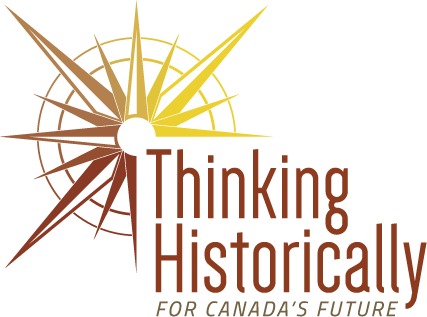Reflections on the History Education in Troubled Times Workshop: A Blog Series
Sara Karn, Postdoctoral Fellow, McMaster University

Workshop Participants (in-person attendees): Jackson Pind, Heather E. McGregor, James Miles, Sara Karn, Maria Vamvalis, Jennifer Tupper, Lindsay Gibson, Nicholas Ng-A-Fook, Kristina R. Llewellyn, Mallory Davies, Penney Clark, Nyein Mya, Heather Stone, Catherine Duquette, Alan Sears
(Photo by Valeria Flores Zambrano).
This blog series offers reflections on the History Education in Troubled Times workshop, held on May 23 and 24, 2025 at McMaster University. The two-day workshop gathered researchers, teacher educators, and K-12 teachers to discuss how history education may better address the most pressing issues of our time, from war and climate crisis to democratic decline and violence against marginalized communities.
The first day involved a group of researchers and teacher educators from across Canada collectively reviewing and discussing their chapters for an edited book on this topic. On the second day, the group led a session with K-12 teachers as part of a conference hosted by the Ontario History and Social Science Teachers’ Association (OHASSTA).
The workshop was facilitated by Dr. Sara Karn (McMaster University), Dr. Kristina R. Llewellyn (McMaster University), and Dr. Penney Clark (The University of British Columbia). They were joined by 16 participants, including 3 graduate student authors and 1 graduate research assistant, all of whom have contributed reflections on their experiences during the workshop for this blog series.
Valeria Flores Zambrano (PhD Student, McMaster University) expresses what it meant to be part of a workshop that centres collaboration, conversation, and community within history education. Mallory Davies (PhD Candidate, University of Waterloo) further reflects on the supportive scholarly community that emerged from the workshop, and how this experience has helped her navigate her own research and teaching. Keeley Friar (PhD Student, Trent University) critically reflects on the importance of connecting the past, present, and future, while highlighting the voices of Indigenous peoples and the need to live in reciprocal relationships with the land. Nyein Mya (PhD Candidate, University of Ottawa) recounts how researchers and teachers came together to share their experiences with addressing histories of oppression and violence in Canada, and how we might live better with others.
The workshop was generously supported by a Social Sciences and Humanities Research Council (SSHRC) Connection Grant, Thinking Historically for Canada’s Future Special Funding – Knowledge Mobilization, and Canadian Historical Association Collaborative Fund. Other event partners include the Wilson College of Leadership & Civic Engagement, Department of History, and Faculty of Humanities (McMaster), the Department of Curriculum & Pedagogy (UBC), Social Studies Educators Network of Canada (SSENC), and the Ontario History and Social Science Teachers’ Association (OHASSTA).
We are grateful to all our partners and participants for supporting this workshop and contributing to critical conversations about teaching and learning history in troubled times.
Dr. Sara Karn is a Postdoctoral Fellow for Thinking Historically for Canada’s Future and is based in the Department of History at McMaster University. She is the Project Director of the SSHRC Connection Grant, History Education in Troubled Times: Perspectives from Canada. Sara’s research explores empathy and emotion in history education, and she also conducts research on climate justice education as part of the Social Studies & History Education in the Anthropocene Network. She is a certified K-12 teacher in Ontario and has taught environmental education and social studies courses at the postsecondary level.
